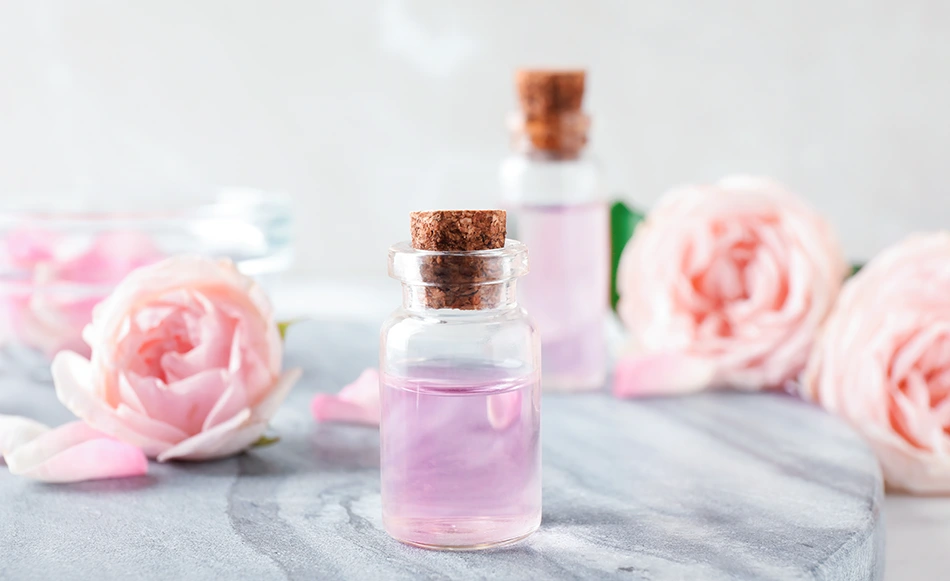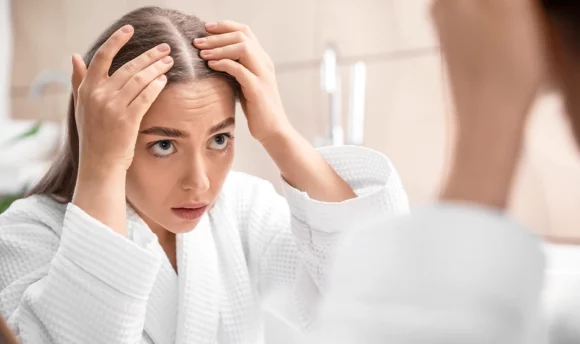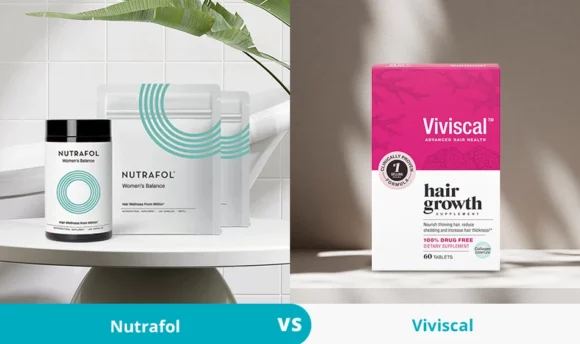Rose Water for Hair Growth: 6 Benefits and Uses
On the lookout for a natural alternative to help you optimize hair growth and add shine to your hair? Rose water could be the perfect solution.

In the beauty world, homemade products are becoming increasingly popular as an option for limiting the use of synthetic ingredients and providing results for a fraction of the price of in-store purchases.
Rose water is a haircare product that can easily be made from the comfort of your own home, using just a few simple ingredients.
More and more people are using it in the hopes of speeding up the growth of their hair and reducing dryness and frizz. But, like any home remedy, you might be left wondering if it actually works.
In this article, you’ll learn about the properties of rose water, easy recipes you can make from home, and the benefits of adding it to your beauty routine.
Does Rose Water Help With Hair Growth?
Yes, using rose water on your hair can help promote hair growth and provide several other desirable effects. The benefits of rose water can be attributed to things like its anti-inflammatory properties and high concentrations of vitamins A and C.
6 Benefits of Rose Water
Although it is great for promoting hair growth, the benefits of rose water for hair go far beyond making it longer. Read on to learn about the many benefits of rose water and why it should become a part of your weekly hair routine.
#1 Reduces dandruff
One of the most sought-after benefits of using rose water for hair is the effect it can have on reducing dandruff.
Anti-inflammatory medications such as topical corticosteroids are commonly prescribed to treat more severe cases of dandruff but can cause other conditions like rosacea, dermatitis, and acne.
Thanks to the anti-inflammatory properties of rose water, it can be used to naturally treat and prevent dandruff without the possible negative side effects of using a prescription drug.
#2 Calms frizzy and dry hair
The main causes of dry and frizzy hair are lack of moisture, hot and humid air, or a combination of the two. Rose products have long been used to moisturize the skin, and they are just as effective at locking moisture into the hair.
If you have curly or dry hair that tends to get frizzy during the day, you may benefit from applying rose oil to your hair to protect it from environmental stressors.
#3 Encourages hair growth
Healthy hair starts with a healthy scalp. Things like clogged hair follicles, excessive oiliness, or a thrown pH balance can have a detrimental effect on the growth of your hair and lead to unnecessary hair loss.
Because rose petals contain vitamins that are good for the hair – like vitamins A, B3, C, and E – they can encourage swift hair growth. Its mild astringent and anti-inflammatory properties also contribute to optimal scalp health, setting the foundation for maximum growth.
#4 Free of synthetic ingredients
Using rose water for hair is ideal for anyone preferring a natural hair routine that is free of synthetic products whose names you can’t pronounce.
Rose petals have been cultivated since around the late 7th century AD and are used to treat a variety of ailments. Aside from those with an allergy to roses, it can be used on the skin and hair and even consumed with no known negative side effects.
Unlike many beauty products which contain artificial fragrances with known endocrine disruptors, you can trust natural products like rose water to provide an array of benefits without compromising your health.
#5 Prevents oily hair
Because rose oil acts as a mild astringent, it can be used as a natural dry shampoo, helping to reduce oiliness on non-hair wash days.
Astringents for hair work by drying the oil produced by the scalp and tightening its pores to prevent oil production. If you suffer from oily hair, you might consider adding witch hazel, another well-known astringent, to your rose water.
#6 Has a pleasant scent
On days when you don’t have time to wash your hair, spraying it with the delightful, floral scent of rose water is the perfect way to enhance its freshness.
Not to mention that the scent of rose oil has aromatic benefits related to reducing stress and tension and has even proven useful in reducing headaches and migraines.
Since high levels of the stress hormones cortisol and adrenaline actually contribute to hair loss, finding ways to reduce your stress levels can help you maintain your thick locks for years to come.
How to Мake Rose Water at Home
Making your own rose water is a great way to save money and ensure all of the ingredients added will contribute to your unique hair goals.
Adding things like lemon, orange, or lavender essential oils to your rose water can improve hair growth, while witch hazel and tea tree oil are additives that can prevent excess oil buildup and reduce scalp flaking.
Here is a simple recipe to help you get started:
Ingredients:
- 1 cup rose petals
- 2 cups distilled water
- A spray bottle for storage
- Essential oils, optional
Instructions:
- Bring two cups of distilled water to a boil in a pot on high heat.
- As the water comes to a boil, use a mortar and pestle, or something similar, to crush the rose petals until you see their natural oils emerge.
- Add your petals to the boiling water, and continue soaking them until they lose their color.
- Once cool, strain the petals from the mixture and mix in a few drops of one essential oil – lemon, orange, or lavender – to the water.
- Pour the liquid into the spray bottle.
How to Use Rose Water
Rose water is an all-natural hair product that can be used in a variety of ways to improve the health of your hair.
Although rose water for hair offers several benefits, be careful not to use it more than a few times a week, as overuse of the product can cause a pH imbalance on the scalp.
#1 Use it as a spray
Rose water can be purchased in a spray bottle or stored in one if you make yours at home. Spraying a light mist onto the hair is a great way to prevent frizz, especially on hot days that you plan to spend outdoors.
#2 Dab it on the scalp
Use a cotton ball or clean fingers to massage rose water directly onto the scalp, keeping it on overnight and washing it out the following morning.
#3 Rinse your hair with it
After shampooing and conditioning your hair, rinse it with rose water. You can either wash it out after 5 minutes or have the option to leave it in until your next wash.
FAQs
Overusing rose water can lead to a pH imbalance on the scalp. Otherwise, only those who are allergic to rose water will experience adverse effects.
Yes, rose water is good for both your hair and scalp. It provides many benefits for hair health, including preventing dandruff and hair loss and promoting the growth of your hair.
No, you should not use rose water every day. Instead, use it a maximum of 3 days per week. Although rose water provides many benefits for hair health, overusing it can lead to a pH imbalance on the scalp.
A Word From a Trichologist
In an age where we expect instant results, it’s normal for us to switch out our hair products as soon as we feel they’re not giving us the results we want.
But if you’re someone who only washes your hair once a week or prefers to limit your product usage, it will take time for any new additions to work their magic.
For this reason, unless you’re experiencing noticeable side effects when using a new product, it’s important to give yourself a few months to try it out before giving up on it.
This is especially true when trying natural options like rose water, as they tend to take longer to work than those made with synthetic ingredients.
Conclusion
Rose water provides a wide variety of benefits related to hair health, including promoting hair growth, preventing hair loss, and setting the foundation for a healthy scalp.
Rose petals, which are used in the creation of rose water, have been cultivated for thousands of years and provide numerous health benefits, not only related to the well-being of hair and skin.
Home recipes for rose water are not only easy to make but can also serve as an opportunity to control the ingredients included in the product and cut costs, making it more budget-friendly.
If you decide to include rose water in your haircare regime, make sure to do so for at least 3 months before making a decision about its efficacy, and limit its use to 3 times per week to prevent negative side effects.

















































 Select your language:
Select your language: 








